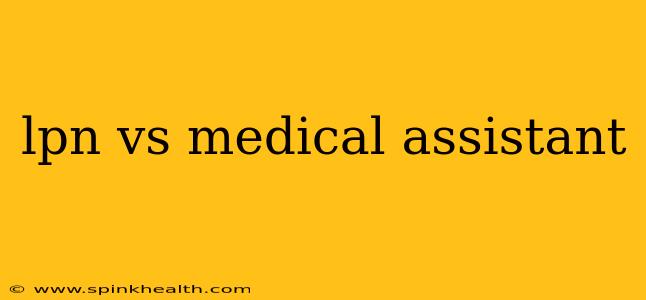LPN vs. Medical Assistant: Unveiling the Differences in a Career Crossroads
Choosing a healthcare career path can feel like navigating a complex maze. Two popular options often leave aspiring professionals wondering, "What's the difference between an LPN and a Medical Assistant?" This isn't just a question of titles; it's about understanding the distinct roles, responsibilities, and educational pathways of these vital healthcare workers. Let's unravel the intricacies of these professions, starting with a compelling narrative that illustrates the core differences.
Imagine two individuals, Sarah and Emily, both working in a bustling doctor's office. Sarah, a Licensed Practical Nurse (LPN), possesses a deeper understanding of patient care, administering medications, monitoring vital signs, and even assisting with wound care. She's authorized to perform more complex procedures under the supervision of a physician or registered nurse. Emily, a Medical Assistant (MA), focuses on administrative and clinical tasks, from scheduling appointments and handling insurance claims to taking patient histories and assisting the physician during examinations. Their roles intertwine, but their responsibilities diverge significantly.
What Does an LPN Do?
LPNs, also known as Licensed Vocational Nurses (LVNs) in some states, are licensed healthcare professionals who provide direct patient care under the supervision of physicians, registered nurses, or other healthcare professionals. Their responsibilities include:
- Administering medications: This is a key difference; MAs generally cannot administer medications independently.
- Monitoring vital signs: LPNs meticulously track and interpret patient's heart rate, blood pressure, temperature, and respiration.
- Wound care: LPNs often assist in cleaning and dressing wounds.
- Collecting specimens: They may collect blood, urine, or other samples for laboratory testing.
- Providing patient education: LPNs educate patients about their medications, treatments, and overall care.
What Does a Medical Assistant Do?
Medical Assistants work in a variety of healthcare settings, supporting both administrative and clinical tasks. Their responsibilities include:
- Scheduling appointments: They manage patient appointments and maintain clinic schedules.
- Handling insurance claims: MAs process insurance paperwork and handle billing procedures.
- Taking patient histories: Gathering patient information and documenting it in medical records.
- Assisting physicians: Preparing patients for examinations and assisting with procedures.
- Sterilizing instruments: Maintaining a clean and sanitary environment for patient care.
What is the Education and Training Required for Each?
The educational paths to becoming an LPN and an MA are quite different:
- LPN Education: Requires completion of an accredited LPN program, typically a one-year certificate or associate's degree program. This program includes extensive clinical experience.
- Medical Assistant Education: MAs can obtain certification through various accredited programs, ranging from certificate programs to associate's degrees. The focus is on both clinical and administrative skills.
How Much Do LPNs and MAs Make?
Salary expectations vary depending on location, experience, and employer:
- LPN Salary: Generally higher than that of a Medical Assistant due to their expanded scope of practice and educational requirements.
- MA Salary: Can be a good starting point in the healthcare field, with potential for increased earnings with experience and additional certifications.
What are the Career Paths and Advancement Opportunities?
Both professions offer opportunities for advancement:
- LPN Career Advancement: LPNs can pursue further education to become Registered Nurses (RNs).
- MA Career Advancement: MAs can specialize in areas like phlebotomy or electrocardiography (ECG) or pursue supervisory roles within their clinics.
Which Career is Right for Me?
The best choice depends on your individual skills, interests, and career goals. Consider these factors:
- Do you enjoy direct patient care and have a strong interest in medical procedures? An LPN path might be more suitable.
- Are you organized, detail-oriented, and comfortable with administrative tasks? A career as a Medical Assistant could be a great fit.
- How much time and financial commitment are you willing to make for education and training? LPN programs typically require more time and commitment.
The LPN vs. Medical Assistant decision isn't a simple "either/or." Both roles are essential in the healthcare system, each offering a unique and rewarding career path. By carefully considering your strengths, interests, and aspirations, you can make an informed decision and embark on a successful journey in the healthcare field.

